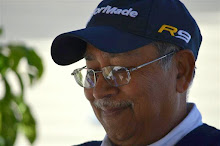The Strong Arm of Project Execution: A Lesson from Farakka
In the early 1990s to be specific in December of 1991, my most challenging posting was at the Farakka NTPC project, a 2x500 MW thermal power station in West Bengal. My predecessor had managed to complete a mere 6% of the work in three years, and I was expected to complete the rest within the same timeframe.
That period was the peak of trade unionism in Bengal, where a mere disagreement could lead to a Bandh (strike). I had heard about it, but my first experience with it was on my very first night in Farakka. Adding to my troubles, I was unwanted at the site. The previous in-charge, SKG, refused to vacate the office, the official car, and even the company bungalow. It was a battle of egos, but eventually, I managed to eject him without any support from regional HQ—a story for another day.
Once in command, I had to tackle several operational bottlenecks, the most critical being the severely delayed turbine piping work. The contractor, PCP, was struggling. The man in charge, Mr. Bose, was a friendly person but lacked the assertiveness to deal with the highly unionized workforce, which would blackmail him for overtime payments before doing any work.
A Local Strongman Enters the Picture
Among the local contractors was Mr. MC (let’s keep his full name anonymous), a tough character who took up all sorts of jobs. He would often drop into my office for casual adda (chat), sometimes hoping for work.
One day, I called Mr. Bose to my office.
"This piping work isn't moving forward, and we don’t have time to waste. I’m taking it off your hands," I said.
Surprisingly, he didn’t resist. “Fine by me, Sir! Just ensure the cost doesn’t exceed what PCP is being paid.”
That was fair enough. I immediately turned to Mr. MC and asked, "Can you do this work at the same price?"
He grinned. "Consider it done."
And to my shock, that very night, the work started—without any formal order!
The Secret Behind Overnight Mobilization
A week later, I called Mr. MC to my office.
"How did you manage to get trained welders and fitters overnight?" I asked, still puzzled.
He threw back his head and laughed. “Simple, Sir! I used the same workers from PCP… but at night!”
I raised an eyebrow. “But weren’t they refusing to work without extra pay?”
He leaned in, his eyes twinkling. "With me, they knew there was no room for blackmail. If they tried, the danda (stick) would do the talking. Union or no union, they knew who was in charge.”
It was a moment of revelation. The same workers who held the previous contractor hostage with their demands worked efficiently under a man they feared and respected.
A Parallel from the Mahabharata
This incident reminded me of a scene from the Mahabharata, where Krishna advised Arjuna that sometimes, winning a battle requires thinking beyond conventional strategies. During the war, when Dronacharya seemed invincible, Krishna devised a psychological trick—spreading the false news of Ashwatthama's death. It was not the purest of tactics, but it achieved the ultimate goal.
Similarly, in project execution, we always prefer lawful methods, but sometimes, practical realities demand unconventional solutions. In Farakka, I learned that:
- Legal contracts and rules are important, but ground-level control matters more.
- A strong local enforcer can break bottlenecks that outsiders struggle with.
- Leadership isn't just about authority; it's about understanding the psychology of your workforce.
From that moment onward, Mr. MC became my strong arm in the project. People knew it too, and that gave me an upper hand in dealing with the unionized environment.
Both 500 MW units of NTPC's in Farakka were successfully commissioned by 1994 and in October of that year I was promoted as General Manager and got posted at Eastern Region,HQ of BHEL.
The Management Lesson
Projects, especially large infrastructure ones, don’t get completed just by following rulebooks. You need to:
- Identify bottlenecks early.
- Find enablers who can deliver, even if they don’t fit conventional leadership models.
- Balance the law with practical ground realities.
Sometimes, having the law on your side is good—but having the other side of the law on your side can be even better!


6 comments:
Practical experience is immensely effective and better than just following the run of the mill approach....
Just wonderful. This reminds me of Rusy Midi's style of working in place like Bihar. Exactly same. Sam, Dam, Dand and Bhed.
At times it has to be applied. Lord Krishna wouldn't have been able to ensure victory of pandavas without this. Truth has and should be ensured to prevail.
With kindest regards 🌷🙏🏽
Thanks Vijay for your linking up with Russi Modi style!
Wonderful experience Sir.. Learning one🌹💐
Thanks DSDT for your comment!
Thanks dear Subhedar, yes always the rule book doesn't help!
Post a Comment